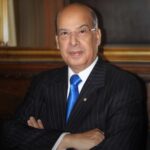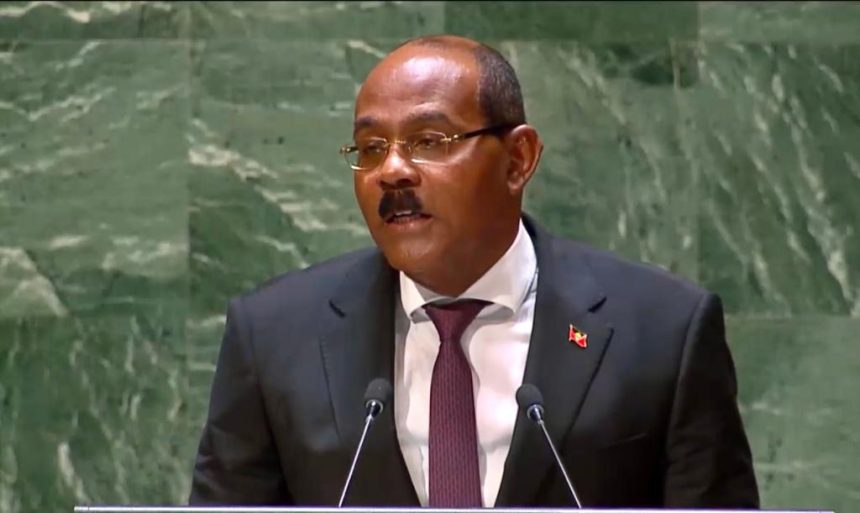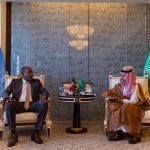Statement by
The Honourable Gaston Browne
Prime Minister, Minister of Finance, Corporate Governance and Public Private Partnerships
of Antigua and Barbuda
at the General Debate
of
the 78th Session
of
The United Nations General Assembly
in New York
on
Friday 22nd September, 2023
Mr. President
Secretary-General
Distinguished Delegates
Antigua and Barbuda congratulate His Excellency Dennis Francis of Trinidad and Tobago on his election as President of this 78th Session of the General Assembly.
We are very proud of the contribution that the countries of the Caribbean Community (CARICOM) are making, to advancing internationalism in this United Nations Organization and in other multilateral bodies.
In this connection, we regard, as a further acknowledgement of CARICOM’s capacity, the election of Guyana to the Security Council from 2024 to 2026.
Of course, Guyana’s further service on the Council follows two years of active participation, by yet another CARICOM state, St Vincent and the Grenadines – the smallest nation in the world to serve on the Security Council.
What these accomplishments demonstrate is that smallness is not an impediment to making significant contributions to international decision-making. Consequently, we expect that the Alliance of Small Island States, (AOSIS) will be given a seat at the table, in other fora, including G20 meetings, even as an Observer.
Mr. President,
The world is failing developing countries.
Those are not my words, but I agree with them.
They are the words of the Secretary-General, António Guterres, spoken less than a week ago.
Developing states, against many odds, have remarkably lifted hundreds of millions from the depths of poverty.
They have been active participants in the United Nations, fervently searching for and offering global solutions.
Yet, despite these strides, they find themselves ensnared in a myriad of global crises which they had no hand in creating.
We are caught in a vortex of skyrocketing prices, overwhelming debts, and the undeniable and increasing frequency of climate disasters.
The current global frameworks, shaped largely by the more affluent nations, remain largely unresponsive to these crises.
A united front can compel the global community to sit up, to listen, and to act.
The developing world must build that unity of purpose.
Not in confrontation, but in collaboration; not in division, but in cooperation.
So, today, I call on the nations, which have been excluded from global decision making and which have been left behind, to bridge the separation of their geographical distance and to join together to advance their collective interest.
This is why, Mr. President, Antigua and Barbuda has embarked on strategies, building alliances with the willing, to counter the threats we face from the impacts of climate change, and the failure of the international financial institutions and their policy makers to respond to the urgent needs of our peoples.
One of these initiatives which is currently taking place, was initiated two years ago in the margins of COP 26 in Glasgow by the Prime Minister of Tuvalu, Kausea Natano, and myself.
Frustrated by the lip service being paid by the world’s major emitters, and the broken promises of every previous COP meeting, we decided that we would seek an Advisory Opinion from the International Tribunal of the Law of the Sea (ITLOS), concerning the obligation of states to combat pollution linked to climate change and its ensuing marine repercussions, such as rising ocean temperatures, sea-level rise, and ocean acidification.
Joined by other small island states, we co-founded the Commission of Small Island States on Climate Change and International Law (COSIS).
COSIS sought and received a favourable agreement by ITLOS to hear our pleadings which began on September 11th in Hamburg and which will continue until September 25th.
Why did we go to ITLOS?
We went to ITLOS because it is the guardian of the 1982 UN Convention on the Law of the Sea.
It is the natural venue to seek legal clarity on the obligations of states to protect our marine environment.
Small island developing states (SIDS) are primarily maritime states.
We depend on the ocean not just for sustenance, but as a crucial part of our heritage and identity.
The ocean is also a vital carbon sink.
With increasing ocean and terrestrial temperatures reaching record highs this summer, burning the planet and simultaneously causing unprecedented storms, flooding and droughts; all nations must act now to safeguard the Oceans as a critical component of the Earth’s climate system.
The countries of COSIS are not seeking to rewrite laws; we are seeking clarity on existing ones.
SIDS cannot sit idly, while our countries sink beneath our feet or are crippled by a burden of debt, as we are left – abandoned by the international system – to rebuild within our own limited means, one disaster after another.
However, taking a case to ITLOS is not an initiative just for the survival of SIDS.
It is a vital effort for the preservation and prosperity of all nations in our shared world.
In this connection, Antigua and Barbuda and the other members of COSIS, will also stand with this General Assembly in its decision – initiated by Vanuatu – to seek an Advisory Opinion from the International Court of Justice, on the obligations of states with respect to climate change.
We consider this as a duty of care for the peoples of the world.
Mr. President,
Another bold initiative we’ve championed revolves around the Multidimensional Vulnerability Index (MVI), as set out by General Assembly in December 2021.
Why the MVI?
Because it is crucial.
SIDS, though not the poorest countries, are extremely vulnerable to climate and other shocks, and lack resilience due to structural problems; of limited human and financial resources, lack of economies of scale and higher costs due to their isolation from major manufacturing hubs.
Therefore, the sole criterion of per capita income, denying us access to concessional financing, is unfair and unjust,
The MVI is not just a tool; it is our gateway to essential financing, to robust national planning, to debt servicing, and possibly our final beacon when seeking insurance and compensation against the rising tides.
Mr. President, we intend to continue to advance these contentions in the international financial institutions.
Particularly, we will raise this urgent issue at the joint meeting of the IMF and World Bank in Marrakesh next month.
We call on all SIDS and all fair-minded countries to join us is advancing the MVI as a vital component in facilitating access to concessional financing.
Mr. President,
Antigua and Barbuda greatly look forward to hosting the Fourth International Conference on Small Island Developing States from May 27th -30th 2024, under the theme “Charting the Course Towards Resilient Prosperity”.
I have highlighted the stark realities faced by SIDS.
We are grappling with the impacts of global phenomena, from the lingering effects of COVID, to climate change and the international economic and financial repercussions of Russia’s incursion into Ukraine.
Additionally, we are burdened with staggering debts, unfavourable trade terms, and a global financial architecture that fails to meet our needs.
Our upcoming conference is therefore, more than just a forum.
We must aim to develop a bold, decade-long strategy that will illuminate the path forward, addressing our unique and interconnected challenges to ensure a resilient and prosperous future for our citizens.
Given these challenges, and in collaboration with the private sector and UN entities, Antigua and Barbuda will establish a Centre of Excellence for SIDS that will enable all SIDS to achieve sustainable resilient prosperity.
The truth is unavoidable: many major greenhouse gas emitting countries have not met their commitments.
The previously set boundary—a temperature rise of no more than 1.5 degrees Celsius above pre-industrial levels, will be breached on the current trajectory.
The risks we face are not just on the horizon—they are here, and they are now; requiring an urgent commitment to reduce emissions.
Small Island States capacity to adjust and to build resilience, cannot keep pace with the fast occurrence of extreme climate events.
And, I emphasize that we will suffer first, but what we will endure is only the precursor of the fate, of every nation.
We are all running out of time and we need to act now to save our one planet
Mr. President
The Summit meeting of the Conference of the Parties (COP) in Dubai will be crucial for the future of the planet.
Not only does COP28 comes at a time where the world is witnessing climate chaos firsthand, but this summit is particularly important because it will include a global stocktake.
Countries will assess how far they have come on cutting planet-heating pollution.
However, the awful truth is already clear.
Eight years after the climate agreement in Paris, global progress has been far from sufficient.
The world is currently not in line with the temperature targets outlined in the Paris Agreement,
According to the European Union’s Climate Change Service, this year’s June to August period was not only the warmest since 1940, but it also saw temperatures soaring towards 1.5 degrees Celsius above preindustrial levels.
A red line – once deemed sacrosanct – will be crossed, if urgent action is not taken.
Warnings have turned to imminent danger.
Therefore, what was already a crucial matter for action at COP28 has now become an imperative for action.
And that is the Loss and Damage Fund for which small island states have been praying, pleading, and begging.
We must recall that all that happened at COP27 last year, is that the world’s greatest polluters agreed, only at the last minute, that such a fund was important.
But agreement was not establishment.
What we got was the formation of a transitional committee to make recommendations for consideration at COP28.
The issue was once again deferred.
Now we must insist at COP28, that the loss and damage fund must be made operational and adequately funded.
It must also provide sufficient financing to help SIDS withstand the inevitable ruin that the actions of the major polluters are continuing to wreak.
If COP28 fails in this critical mission, it risks undermining global trust, potentially sabotaging cooperative efforts on myriad global challenges.
It is my ardent hope that when we gather in Dubai, the shared spirit of responsibility will prevail, such that the dying embers of hope can be reignited by the flame of action.
Mr. President,
Antigua and Barbuda unequivocally asserts, that climate justice and reparatory justice are deeply intertwined. They are inseparable.
It is essential for this esteemed assembly to understand that climate justice is not a standalone concern.
Historically, the nations that thrived on the industrial revolution, did so on the backs of enslaved and victimized generations from the Caribbean and other corners of the African diaspora.
It is unjust that countries that paid the highest human price, are bearing the heaviest climate burden.
A recent UN Report aptly underscores, that while legal routes to compensation may be complex, it by no means nullifies the moral and ethical obligations stemming from these historical wrongs.
We urge the nations complicit in the dark legacy of enslavement to recognize, reconcile, and redress soonest.
Our shared future must be built on justice, understanding and cooperation.
Mr. President,
Another pivotal theme of this General Assembly resonates deeply with us; that is, rebuilding trust and reigniting global solidarity which now stands on shaky ground.
It is worth emphasizing that no nation, large or small, can truly flourish amid such global turbulence.
Particularly for smaller states like mine, which rely heavily on the consistent hum of global stability for essential sectors like tourism, the stakes are incredibly high.
Our plea is simple: we beseech the world’s formidable nations to engage in dialogue and embrace mutual respect.
These are not just pathways to global peace, but also the avenues that ensure the prosperity of every citizen.
Drawing on this theme of trust; I urge the United States to revisit its stance on Cuba.
It is high time for the U.S. to remove Cuba from its list of state sponsors of terrorism, and to bring an end to the outdated embargo that harms the Cuban populace.
Similarly, we advocate for the removal of sanctions on Venezuela, especially those that hinder the Venezuelan government’s access to the U.S. financial system and block oil imports from the state-owned PDVSA.
It cannot be ignored, that these sanctions amplify the humanitarian crisis in Venezuela, contributing to the very large number of refugees into neighbouring countries. The sanctions also harm innocent Caribbean countries that hitherto benefitted from the Petro Caribe initiative, which served as an energy price stabilisation mechanism for these countries.
As members of this United Nations Organization, we are all bound by its Charter that enshrines dialogue and peaceful conflict resolution.
Today, I fervently urge every nation, to recommit to these cornerstone principles, ensuring they are respected, and followed, as the bedrock of all international relations.
Mr. President, I now turn to Haiti.
The enduring challenges faced by Haiti remain at the forefront of international consciousness.
Historically, the scars of Haiti’s struggle for freedom from enslavement are juxtaposed with the exploitative economic interests of France in the 18th and 19th centuries, and have left deep imprints.
The burden of compensating France for over a century, essentially buying their liberty, has curtailed the developmental potential of the Haitian people for generations.
Subsequent interventions, compounded these challenges.
Internally, episodes of autocratic leadership have further eroded the national fabric.
The recent mission by the CARICOM Eminent Persons Group, seeking a resolution to Haiti’s political deadlock, voiced deep concerns over the rising dominance of gangs and the ensuing human rights crisis.
The immediate imperatives are clear: An urgent, comprehensive, coordinated intervention is required; that will concurrently restore governance, security and the rule of law, while resolving the humanitarian needs.
The CARICOM Eminent persons strongly recommended that a broad-based transitional government is the linchpin for effective governance.
It is our aspiration that this proposed representative transitional government materialises, to provide the necessary leadership that is required; with external assistance to restore order and bring lasting peace and prosperity to the Haitian people.
Antigua and Barbuda stands resolutely in solidarity with the Haitian people.
In this regard, I reaffirm my government’s pledge to collaborate with all Haitian stakeholders, and with the international community, in the efforts to reinstate the rule law, restoring democracy and assisting with security and humanitarian relief.
The people of Haiti deserve no less.
Mr. President,
The use of illegal guns accounts for a significant percent of all recorded homicides, in the Caribbean.
At an average homicide rate of 15.1 per 100,000 people, this is nearly three times the world average.
Yet, Mr. President, no country in the Caribbean manufactures a single weapon or one round of ammunition.
The majority of these weapons originate in the United States from which they are smuggled or trafficked, to bolster organised criminals involved in trafficking illicit narcotics.
In any event, the fallout from these illegal guns, is their increasing use in Caribbean countries and the clear threat that they pose to our societies and the capacity of our law enforcement to cope.
Given that all our countries are bordered by vast expanses of sea, we face further challenges to obtain modern technology, including satellite imagery, radar and surveillance systems to try to stop the smuggling of weapons.
But Mr. President, while our region is confronting the threats to our security, arising from illegal traditional weapons; we are even more alarmed at the potential for autonomous weapons to fall into the hands of organised criminals.
Consider a drone, meticulously programmed with facial recognition technology, set to target an individual.
It scans, identifies, and eliminates its target all while operating undetected.
Mr. President, this isn’t the plot of a dystopian novel, but a looming reality.
Just a month ago, under the theme of “A New Agenda for Peace,” the UN Secretary-General sounded the alarm bell.
He has urged nations to formulate a legally binding instrument by 2026 to prohibit lethal autonomous weapon systems.
Antigua and Barbuda fully support this recommendation, and we will work with other nations to successfully conclude an international treaty that shields our societies and safeguards our national security from this threat.
Mr. President
Antigua and Barbuda is small in size, without military might and financial influence, but our spirit stands tall.
We refuse to let our size diminish our voice, or lessen our rightful place at the decision-making table.
Since our first steps as a sovereign state, we have championed a world where equity, fairness, and social justice are not mere buzzwords, but lived realities.
And yet, with a heavy heart, we note the ever-widening chasm between the affluent and the struggling, between those who hold the reins of power and those who yearn for their rightful share.
Year after year, leaders like myself stand at this podium.
We speak of financial justice, of climate justice.
But our cries, it seems, echo in a vast void.
Words abound, but transformative action remains elusive.
I often sense the scepticism from my fellow citizens—when they ask, why speak when it feels like the world isn’t truly listening?
But, Mr. President, I remember this; during the COVID-19 pandemic, it was the tiniest of microbes, unseen and unanticipated, that brought nations—great and small—to their knees.
It wasn’t an arsenal of weapons or a mountain of wealth that provided a beacon in those dark times—it was global cooperation.
It was collective global action.
The same truth applies beyond pandemics.
Whether we aim for a world steeped in peace, basking in prosperity, or forward-looking in progress; our only hope lies in banding together.
Every nation, regardless of its power or wealth, shares this interwoven destiny.
Therefore, let us never relent in our pursuit of change.
For the sake of humanity, for our shared planet, let us shape a world that’s not only better but also just, prosperous, and inclusive for all.
Antigua and Barbuda stands ready, as ever, to play its part.
We call on the powerful and rich states to do the same.
Thank you.










